A Giant Jesus in East Timor
While packing for my next day's departure to London, I had one eye on Hitchcock's Dial M for Murder and the other on my steam iron going over my cotton trousers. An attache case, some latch keys, a stocking, a few letters, and a phone call were to add up to the perfect murder in London. Life was simple back in those days, I thought. Then the phone rang.
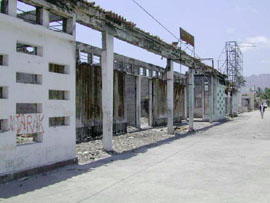 I shifted my smoke to the corner of my mouth and reached across the ironing board for the receiver. It was junior reporter Junko. After a brief exchange of hellos she asked, "So how was your trip to East Timor?" I assumed she was at her desk in the newsroom.
I shifted my smoke to the corner of my mouth and reached across the ironing board for the receiver. It was junior reporter Junko. After a brief exchange of hellos she asked, "So how was your trip to East Timor?" I assumed she was at her desk in the newsroom.
"Splendid, me luv," I said in my best Queen's English. I flipped over the trousers and started on the other side.
"Why are you talking like that?"
"Going to pop on over to jolly ol' England."
"Cut the funny stuff. What about Timor?"
With my ashtray within striking distance and my smokes by the phone, I set the iron upright and began my tale.
I had never before been to a place where everything in sight had been burned. That is indeed the situation in driving through the city from the airport. Unless recently rebuilt, the roofs, doors, walls, and any wood accoutrements of every building are now gone. Darkened concrete skeletons only remain. Welcome to Dili, East Timor.
The city is mainly in the hands of the UN now.
This will probably be the case until a Timorese
Government is established through a series of elections
and general infrastructure is rebuilt.
In the meantime, the presence of soldiers is apparent everywhere. Their activity though is surprisingly minimal. At a coffee shop, I overheard the following conversation:
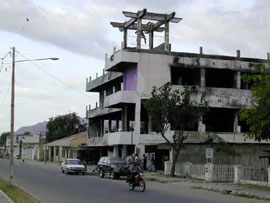 Coffee Shop worker: "What are you doing today?"
Coffee Shop worker: "What are you doing today?"
Spanish UN soldier: "Officially, working for the UN. Unofficially, nothing."
This isn't solely limited to Spanish soldiers. New Zealand and Australian soldiers, camouflaged and packing an impressive selection of rifles, seemed just as bored in sipping their cappuccinos and espressos. This is the result of most of the action having moved to West Timor where some 120,000 refugees are situated in camps, hoping to return east.
Should they return, they will find a city overrun by foreigners. Mostly the aforementioned UN soldiers, but also various aid workers and investors. The initials of the world's largest peacekeeping force is stenciled in large black block letters on about every other car moving through the city. This is a boon for business, the car business, that is.
Though the primary means of acquiring fuel is by purchasing jugs of gasoline of questionable quality from a roadside dealer, getting transportation is not a problem. At Pegasus Autos, seller of Japanese cars, "Eighteen sedans were sold last month, cash. Mostly to UN workers. We've got another 30 coming in this month," claimed an employee. Additionally, cars flood in from Singapore as well.
Housing is something else entirely. While at the Verandah Restaurant, where the rumor of the existence of half-naked Brazilian waitresses proved false, a flyer read: "Tired of Living in a box? Break free and spread out at the Tropicana Guest House. Premium quality rooms for discerning guests. No dongers, demountables, workers huts or converted shipping containers."
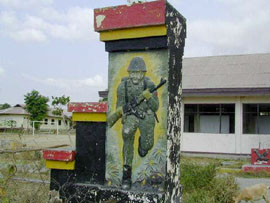 Yes, people are living in converted shipping containers in Dili. I don't know what the first two forms of accommodation mentioned are, but the names weren't quite attractive enough for me to consider a change or even further investigation. My room at the Dili 2000 Hotel, while lacking a personal shower and bathroom, was acceptable.
Yes, people are living in converted shipping containers in Dili. I don't know what the first two forms of accommodation mentioned are, but the names weren't quite attractive enough for me to consider a change or even further investigation. My room at the Dili 2000 Hotel, while lacking a personal shower and bathroom, was acceptable.
As for the containers, some 400 are mounted on a barge in the lagoon. US $120 a night is what they are getting for the, as I heard one former guest describe as, "coffin-like accommodations." Earlier this year the charge was up around $180. As the flyer reveals, competition and improved housing options have hit the market and brought down prices. Though in gazing from the appropriately named restaurant towards the rather ramshackle-looking guestrooms, it would seem the latter is a little dubious. But I suppose it will come in time.
Office space it would seem is equally challenging.
"I went over to check on the progress at my office today," said a customer at a home improvement store to the manager, obviously his new landlord. "It seems your workers are behind schedule. It's gonna take the painters another two weeks at least."
"No, I checked. It will be ready in one week, I promise," said the manager.
"What about the chickens in the stairwells and that monkey dangling from the rope?"
"No problem, everything will be ready."
Outside the store I got played for a monkey when a kid sold me a copy of the Timor Post for AU $1. After looking more closely I saw that it is an Indonesian language paper.
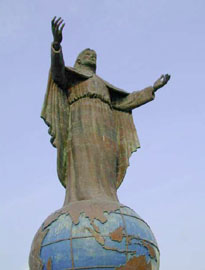 Walking
around at night though is much more pleasant than renting
an office or buying a newspaper. Aside from the lack of streetlights,
the enormous sections of broken pavement, and exposed re-bar,
walking at night is very safe and pleasant (this is important
for the large number of folks that frequent the foreigner
friendly bars scattered throughout the city). Strangely, in
some sections Christmas lights line selected streets. But
then again, perhaps only strange in the time of year, for
the desire to worship as Catholics is one of the main reasons
for the separation from Indonesia. And nowhere is this want
shown more than at Ponto Fatocama.
Walking
around at night though is much more pleasant than renting
an office or buying a newspaper. Aside from the lack of streetlights,
the enormous sections of broken pavement, and exposed re-bar,
walking at night is very safe and pleasant (this is important
for the large number of folks that frequent the foreigner
friendly bars scattered throughout the city). Strangely, in
some sections Christmas lights line selected streets. But
then again, perhaps only strange in the time of year, for
the desire to worship as Catholics is one of the main reasons
for the separation from Indonesia. And nowhere is this want
shown more than at Ponto Fatocama.
About 10 minutes outside of Dili at the top of a point that juts out into the sea is the second largest statue of Christ in the world. Christ's arms rise to the sky as he overlooks Dili. But while the main church in town is consistently packed on Sundays with extremely well-dressed worshippers, some folks seem to be happy if they can get back on with their lives.
At the Copa Restaurant in Manatuto (an 80-minute drive east along a very nice coastline), I asked the waitress, 18-year old Imelda, what she wants to do in the future.
"I want to go to Dili and study at the university but it has not opened yet. I must learn English better and how to use a computer."
I then asked what it was like for the people one-year ago when the conflict was peaking.
"I don't want to know about the other people here. I just worry about myself and my family."
As I finished my spaghetti, she asked, "Why do you want to talk to me? Why are you interested?"
Even when a few hundred thousand people are driven from their homes and thousands of others are killed in the span of a few weeks, perspective, with regards to its impact on the world, can get a little blurred.
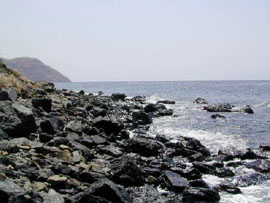 By this time I had moved onto my couch and my fourth smoke.
By this time I had moved onto my couch and my fourth smoke.
"So who's the cocktail waitress in London?" asked Junko, insinuating that this trip might be more pleasure than business.
"My dear, as you know, I'm always one to get down to brass tacks on business trips. Cocktail waitresses are not my sole source of motivation..."
She started coughing uncontrollably.
"But if you must know," I continued, "someone has to investigate why Nomura International backed out of buying the Millennium Dome."
"I heard the Dome was taking bribes during the construction and involved in financial cover-ups afterwards," she said, getting her voice back.
"Exactly my point, Japanese business 101 scripted beautifully. How can Nomura just walk away when all the preliminaries have already been taken care of?"
She was stumped as well. The English inspector, however, was not. By the end, he proved that the husband had indeed attempted to murder his wife and another Hitchcock movie ended somewhat happily.
Coming next week: a look at the Millennium Dome

